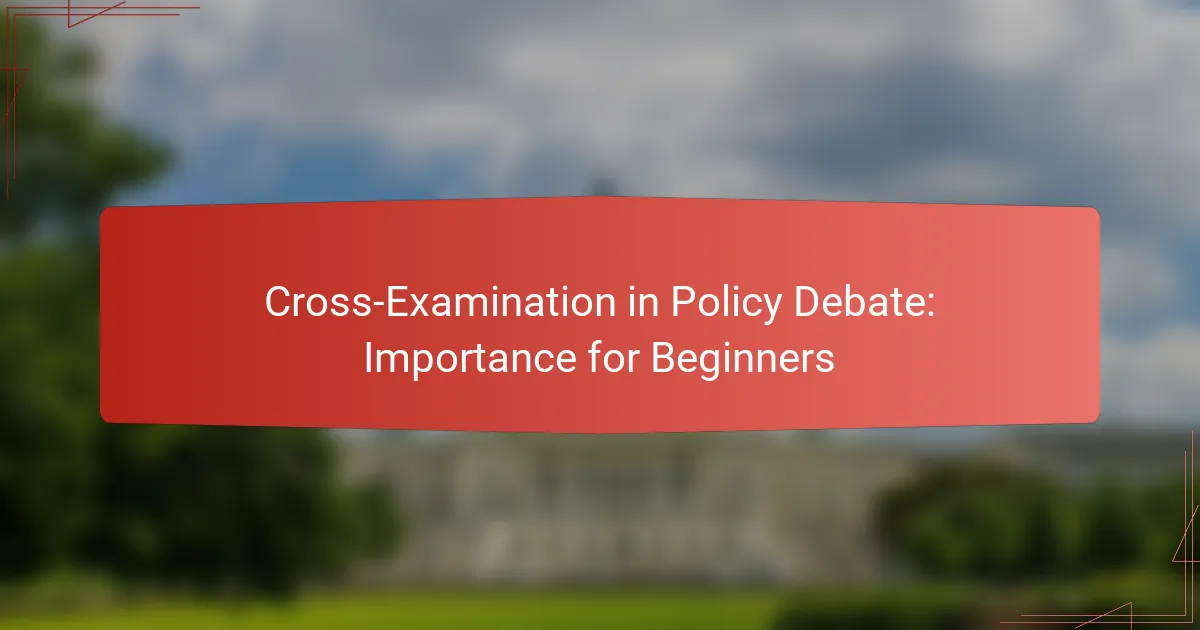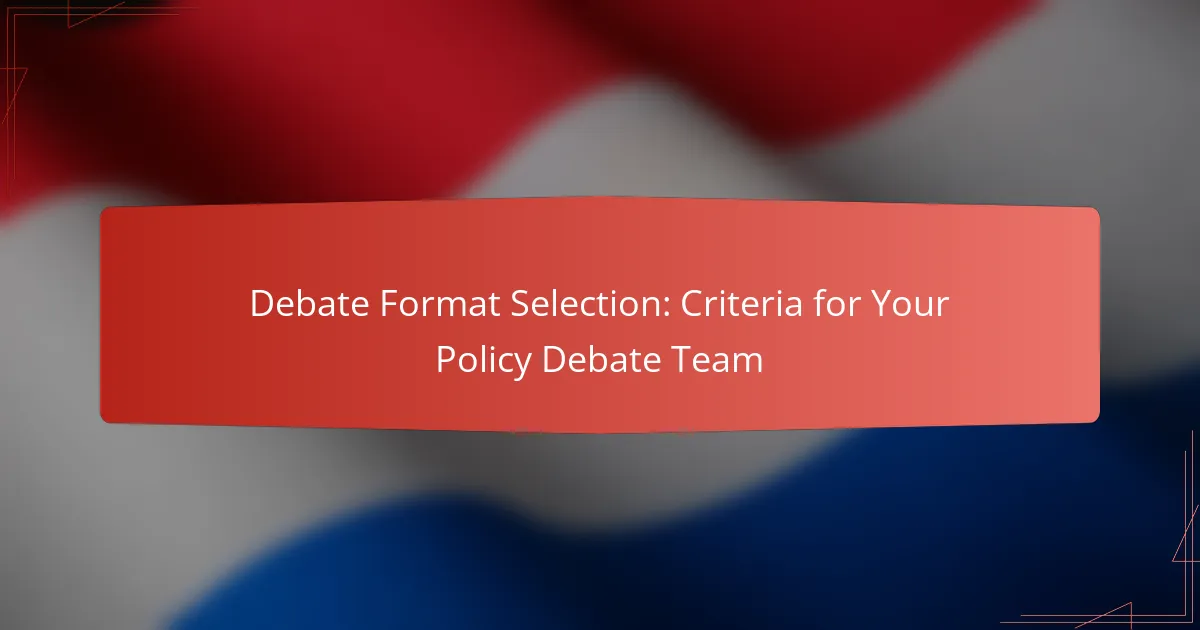Cross-examination is essential for beginners in policy debate, as it not only deepens their understanding of arguments but also sharpens their critical thinking skills. This interactive process enables debaters to clarify points and challenge assertions, fostering a more dynamic exchange of ideas. By mastering effective questioning techniques and maintaining composure, novices can significantly enhance their debating prowess and build confidence in their abilities.
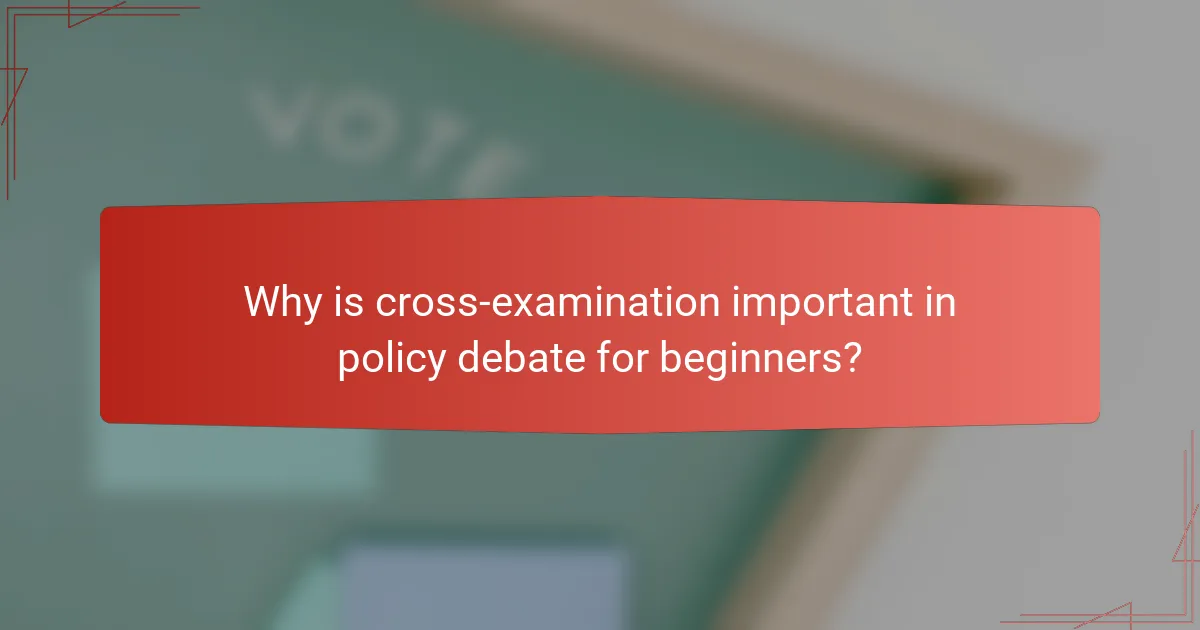
Why is cross-examination important in policy debate for beginners?
Cross-examination is crucial for beginners in policy debate as it fosters a deeper understanding of arguments and enhances the ability to think critically. This interactive component allows debaters to clarify points, challenge assertions, and develop their reasoning skills in real-time.
Enhances critical thinking skills
Cross-examination encourages debaters to analyze arguments critically and assess their validity. By questioning opponents, beginners learn to identify logical fallacies and weaknesses in reasoning, which sharpens their analytical abilities.
Practicing cross-examination helps debaters think on their feet, as they must quickly formulate questions and responses. This skill is vital in developing a nuanced understanding of complex issues, which is essential in policy debate.
Improves argumentation techniques
Engaging in cross-examination allows beginners to refine their argumentation techniques by observing how effective questioning can dismantle an opponent’s case. This process teaches debaters to construct stronger, more persuasive arguments by anticipating counterarguments.
Additionally, beginners can learn to use evidence more effectively during cross-examination. By asking targeted questions, they can draw out specific information that supports their case, making their arguments more compelling.
Builds confidence in public speaking
Cross-examination provides a platform for beginners to practice public speaking in a supportive environment. As they engage with opponents and respond to questions, they become more comfortable articulating their thoughts clearly and confidently.
Regular practice in cross-examination settings can help reduce anxiety associated with public speaking. Over time, beginners develop a more assertive presence, which is beneficial not only in debates but also in various professional and social situations.
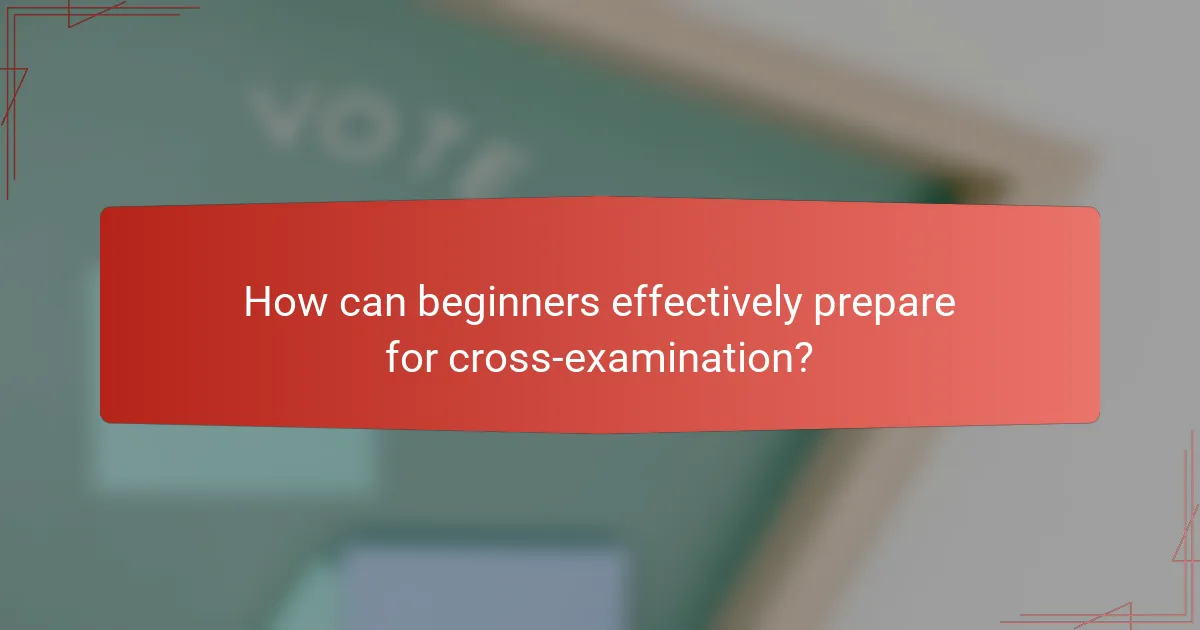
How can beginners effectively prepare for cross-examination?
Beginners can prepare for cross-examination by focusing on understanding their opponent’s arguments, practicing how to ask effective questions, and participating in mock debates. These steps help build confidence and improve critical thinking skills necessary for successful cross-examination.
Researching the opponent’s case
Thoroughly researching the opponent’s case is essential for effective cross-examination. This involves analyzing their arguments, evidence, and potential weaknesses. Beginners should take notes on key points and anticipate counterarguments to prepare for questioning.
Utilize various sources such as academic articles, policy papers, and previous debates to gather comprehensive information. Understanding the context and nuances of the opponent’s position will enable you to craft targeted questions that challenge their assertions.
Practicing question formulation
Practicing how to formulate questions is crucial for beginners to enhance their cross-examination skills. Focus on creating open-ended questions that encourage detailed responses, as well as closed questions that require specific answers. This variety allows for a dynamic exchange during the debate.
Consider using the “5 Ws” (who, what, when, where, why) as a framework to develop questions. For instance, asking “Why do you believe this policy will succeed?” can reveal the opponent’s reasoning and expose gaps in their argument.
Engaging in mock debates
Engaging in mock debates provides a practical environment for beginners to practice cross-examination techniques. These simulations allow participants to apply their research and question formulation skills in real-time, receiving immediate feedback from peers or coaches.
Set up scenarios that mimic actual debate conditions, including time limits and specific topics. This practice not only builds confidence but also helps refine questioning strategies and enhances overall debate performance.
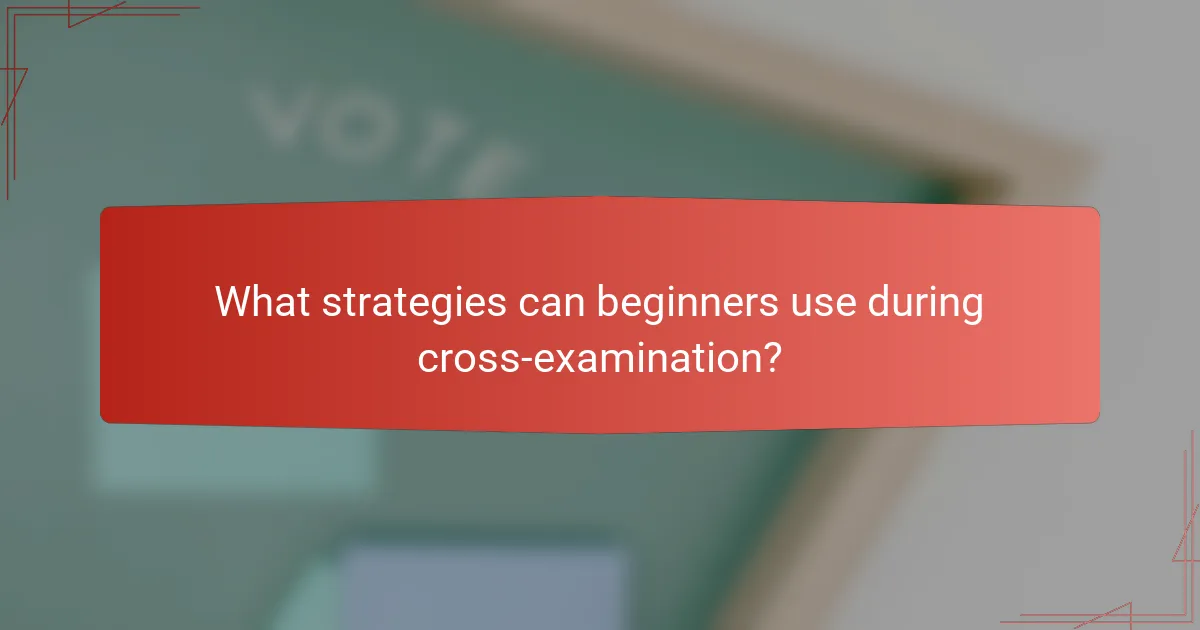
What strategies can beginners use during cross-examination?
Beginners in policy debate can enhance their cross-examination skills by employing strategies that focus on clarity, evidence, and composure. Effective questioning can reveal weaknesses in an opponent’s argument while maintaining a confident demeanor is crucial for credibility.
Asking clarifying questions
Asking clarifying questions helps to ensure that both the debater and the audience understand the opponent’s arguments clearly. Beginners should focus on open-ended questions that require detailed responses, which can expose gaps in reasoning. For example, instead of asking, “Do you agree with this point?” a more effective question would be, “Can you explain how your evidence supports your claim?”
It’s also beneficial to ask follow-up questions based on the opponent’s responses. This approach not only demonstrates engagement but can also lead to further clarification or contradictions that may weaken their position.
Using evidence to support questions
Incorporating evidence into questions can strengthen a debater’s position during cross-examination. Beginners should familiarize themselves with relevant data and studies that support their inquiries. For instance, if an opponent claims a policy will reduce costs, a debater might ask, “What studies support your assertion, and how do they account for potential hidden costs?”
Using evidence not only bolsters the question but also places the burden of proof on the opponent. This tactic encourages them to defend their claims with credible sources, which can be challenging if their evidence is weak or outdated.
Maintaining composure and poise
Maintaining composure and poise during cross-examination is essential for beginners to project confidence and authority. Nervousness can undermine the effectiveness of questioning, so practicing relaxation techniques before a debate can be beneficial. Simple strategies like deep breathing or positive visualization can help manage anxiety.
Additionally, a calm demeanor allows debaters to think critically and respond effectively to unexpected answers. Beginners should practice their delivery and body language, ensuring they maintain eye contact and use a steady tone to convey confidence and control.
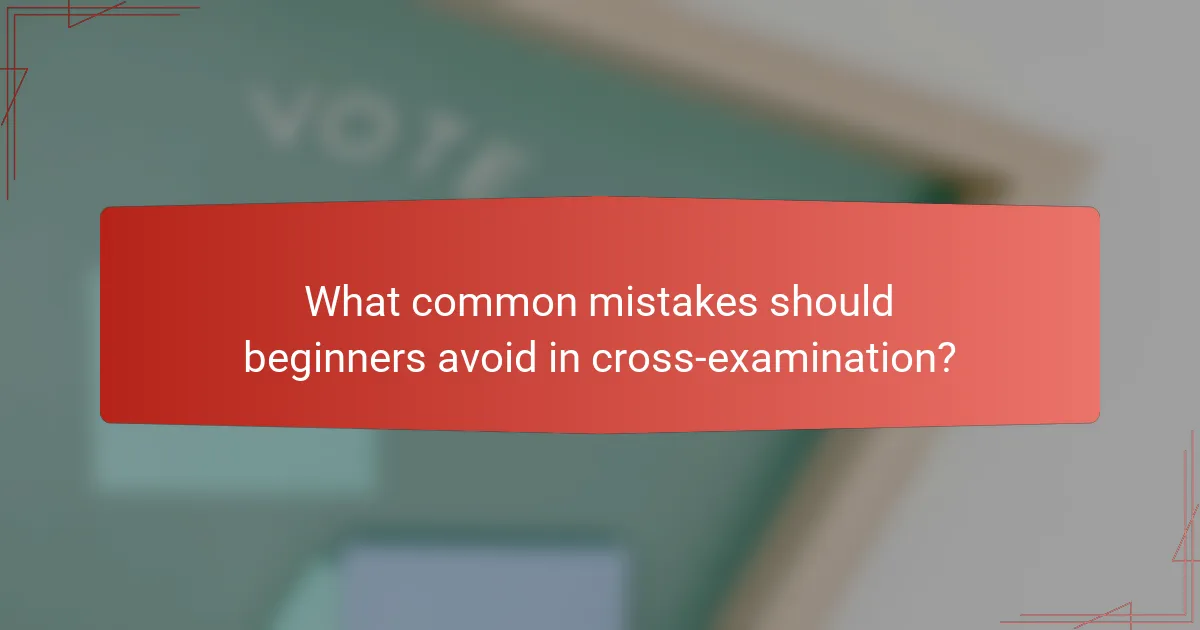
What common mistakes should beginners avoid in cross-examination?
Beginners in cross-examination often make several key mistakes that can undermine their effectiveness. Avoiding these pitfalls can significantly enhance your ability to engage with opponents and clarify arguments.
Failing to listen actively
Active listening is crucial during cross-examination. Beginners often focus too much on their next question rather than fully understanding the opponent’s responses. This can lead to missed opportunities to challenge claims or clarify points.
To improve active listening, maintain eye contact and take notes on key points made by the opponent. This will help you formulate follow-up questions that are relevant and impactful.
Asking leading questions
Leading questions suggest a particular answer and can weaken your position. Beginners might unintentionally frame questions in a way that limits the opponent’s response, making it easier for them to evade critical issues.
Instead, ask open-ended questions that allow for a broader range of answers. For example, rather than asking, “You agree that this policy is ineffective, right?” try “What are your thoughts on the effectiveness of this policy?”
Overloading with complex questions
Complex questions can confuse both the opponent and the judge, leading to unclear answers. Beginners may combine multiple inquiries into one, making it difficult to address specific points effectively.
Keep questions simple and focused. Aim for clarity by asking one question at a time, which allows for more straightforward responses. For instance, instead of asking, “How does this policy impact the economy and social welfare?” break it down into two separate questions.
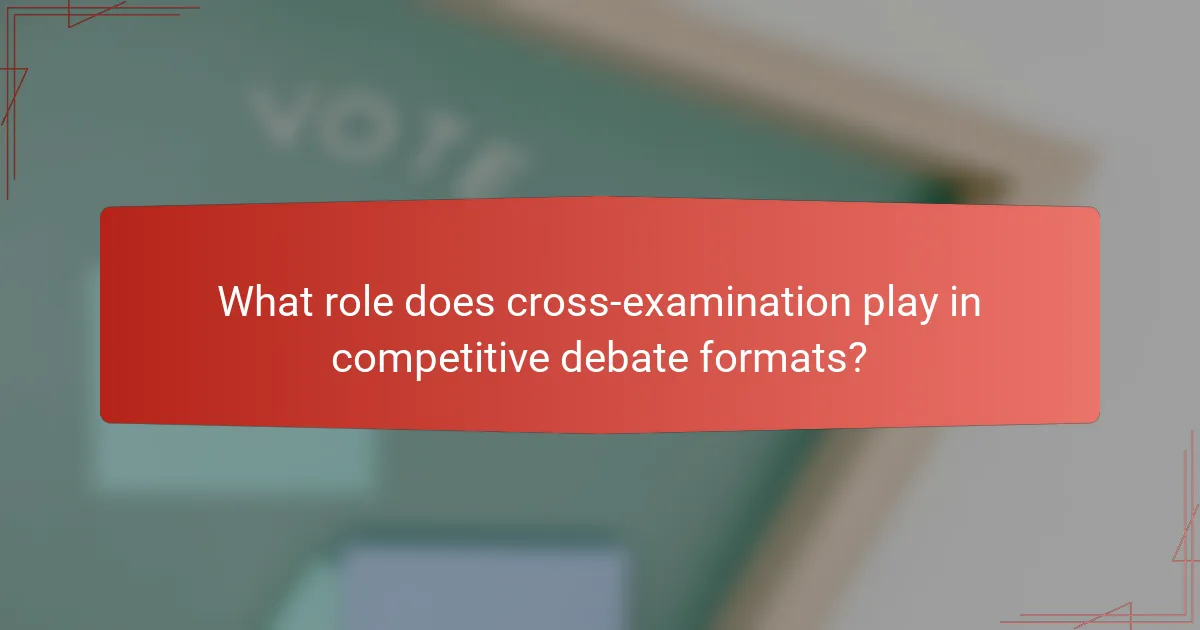
What role does cross-examination play in competitive debate formats?
Cross-examination is a crucial component of competitive debate formats, allowing debaters to question their opponents directly. This interaction not only clarifies arguments but also helps establish credibility and influence the judge’s decision-making process.
Influences judge perceptions
During cross-examination, debaters have the opportunity to highlight weaknesses in their opponent’s arguments, which can significantly shape how judges perceive the overall debate. Effective questioning can expose flaws or inconsistencies, leading judges to favor one side over the other.
For instance, a well-phrased question that reveals a lack of evidence can sway a judge’s opinion. Debaters should aim to ask questions that not only challenge their opponent’s claims but also reinforce their own position, ensuring that judges are left with a clear impression of their argument’s strength.
Shapes the flow of the debate
Cross-examination plays a vital role in determining the direction and pace of the debate. It provides debaters with a chance to steer the conversation towards their preferred topics, allowing them to control the narrative and emphasize key points.
Debaters should prepare strategic questions that not only clarify their opponent’s stance but also redirect the discussion in a way that benefits their case. This can involve asking questions that lead to admissions or concessions, which can then be used to bolster their own arguments in subsequent speeches.
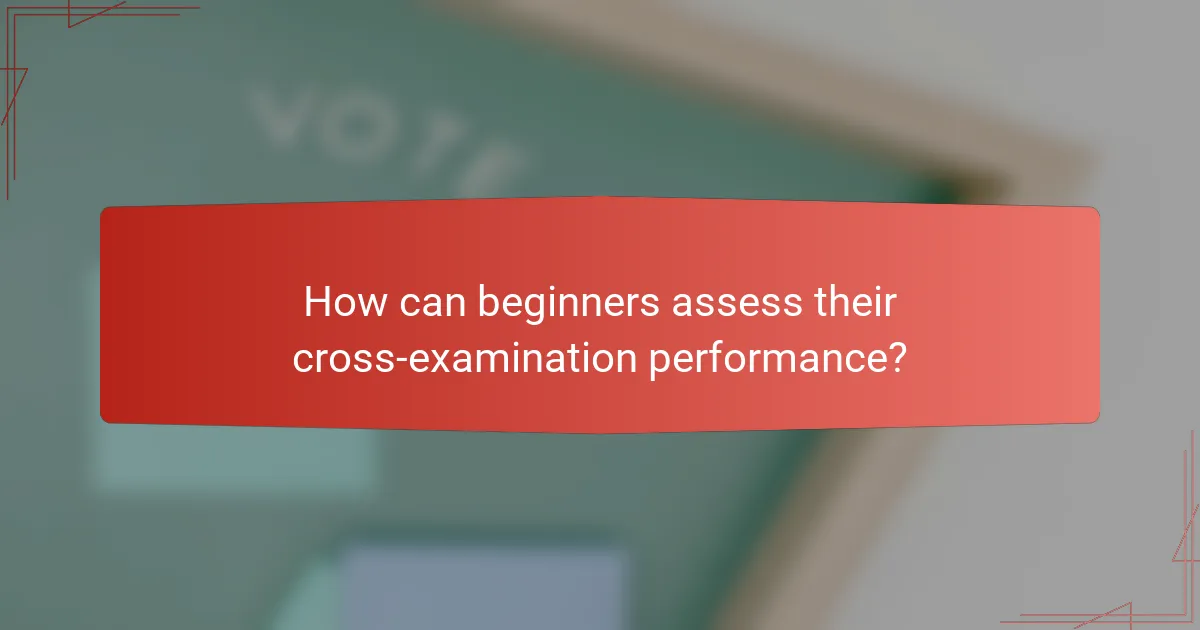
How can beginners assess their cross-examination performance?
Beginners can assess their cross-examination performance by reviewing recordings of their debates, seeking constructive feedback from coaches, and participating in peer evaluations. These methods provide valuable insights into strengths and areas for improvement.
Reviewing debate recordings
Watching recordings of your debates is a crucial step in assessing cross-examination performance. Pay attention to your questioning style, clarity, and how effectively you engage with your opponent’s responses. Note specific moments where you felt strong or struggled, and look for patterns in your questioning techniques.
Consider creating a checklist of key elements to observe, such as the relevance of your questions, the ability to follow up on answers, and the overall flow of the exchange. This can help you focus on areas that need improvement.
Seeking feedback from coaches
Coaches can provide expert insights into your cross-examination skills. Schedule regular feedback sessions where you discuss specific debates and your performance. Ask targeted questions about your questioning techniques and how well you challenged your opponent’s arguments.
Be open to constructive criticism and take notes on your coach’s suggestions. Implementing their advice can lead to noticeable improvements in your technique and confidence during cross-examinations.
Participating in peer evaluations
Engaging in peer evaluations allows you to gain different perspectives on your cross-examination performance. Partner with fellow debaters to critique each other’s techniques and strategies. This collaborative approach can reveal strengths you may not have recognized and highlight areas needing attention.
Establish a structured format for evaluations, focusing on specific aspects such as question clarity, engagement level, and adaptability during the exchange. This will ensure that feedback is constructive and actionable, aiding your development as a debater.
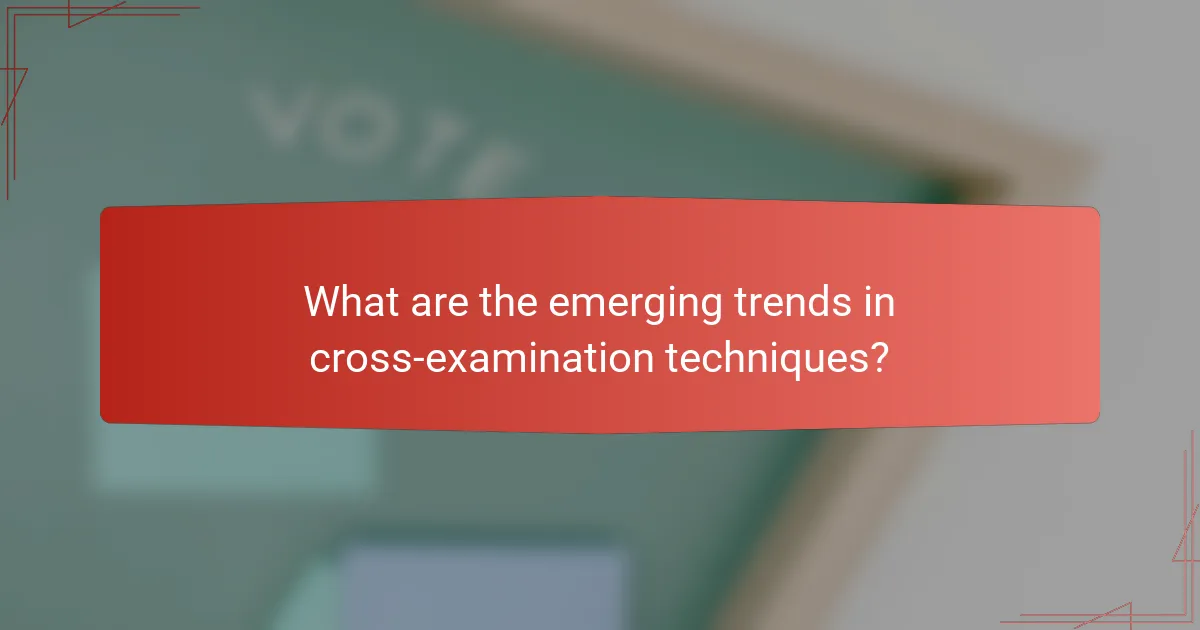
What are the emerging trends in cross-examination techniques?
Emerging trends in cross-examination techniques focus on strategic questioning, adaptability, and the use of technology to enhance clarity and engagement. Beginners are increasingly encouraged to develop a questioning style that is both assertive and flexible, allowing for real-time adjustments based on the opponent’s responses.
Increased Use of Technology
Debaters are now incorporating digital tools to streamline their cross-examination techniques. Video analysis software can help debaters review their performances and identify areas for improvement. Additionally, online platforms allow for practice debates that can simulate real-time questioning scenarios.
Focus on Strategic Questioning
Strategic questioning has become a key trend, emphasizing the importance of asking open-ended questions that encourage detailed responses. This approach helps debaters uncover weaknesses in their opponent’s arguments while also demonstrating critical thinking skills. Beginners should practice formulating questions that not only challenge the opponent but also reinforce their own case.
Adaptability in Responses
Adaptability is crucial during cross-examination, as debaters must be prepared to pivot based on their opponent’s answers. This trend encourages beginners to listen actively and think on their feet, allowing them to exploit any inconsistencies or weaknesses that arise. Practicing with peers can help develop this skill, enabling debaters to respond effectively under pressure.
